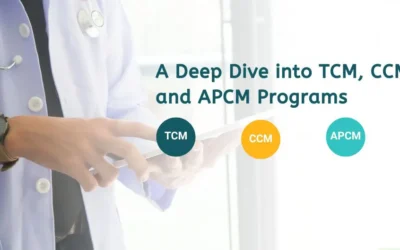
The Power of Partnership: RPM and CCM in Modern Healthcare
Individuals suffering from chronic health disorders pay 90% of the country’s annual healthcare costs, which are approximately $4.5 trillion. Almost all healthcare organizations are turning to remote healthcare programs like remote patient monitoring (RPM) and chronic care management (CCM) to decrease healthcare expenses and provide more efficient treatment to patients with chronic conditions. While RPM and CCM provide significant benefits on their own, they offer a potent synergy when coupled.
This article will explain how RPM and CCM services together can lead to:
- Better patient outcomes
- Improved patient engagement
- Increased customization of care
- Proactive healthcare delivery
- Increased cost-effectiveness
Analyzing these five domains, we illustrate how integrating RPM and CCM could be useful in addressing chronic disease and costs.
Real-Time Data Collection in RPM and CCM
Remote Patient Monitoring is a concept that employs remote patient monitoring devices to capture clinical health information and send it to the caregivers without the need for repeated physical visits. If linked to CCM services, RPM provides healthcare workers with a current, accurate picture of the patient’s condition. This ensures early identification and management of patients who need their care plan modified to prevent the complications of chronic diseases.
Enhanced Patient Engagement
Patient engagement is a cornerstone of effective healthcare, especially in managing chronic conditions. CCM services focus on building strong patient-provider relationships, educating patients about their conditions, and fostering self-management. RPM complements this approach by actively involving patients in their care and monitoring their condition daily. When RPM and CCM are combined, patients see their daily health metrics and witness the direct impact of their lifestyle choices on their situation. This heightened engagement results in better adherence to treatment plans and healthier lifestyles, ultimately improving outcomes.
Customizing Care with RPM and CCM
The healthcare requirements of each chronic care patient may vary widely. Remote patient monitoring makes it easier to gather specific data, enabling the healthcare provider to develop a plan of care that meets the individual’s needs. CCM services, therefore, use this information to develop specific care plans that sufficiently capture the patient’s needs and objectives. Any other model does not offer this level of individualization and would not be feasible without RPM which feeds in a constant flow of data for more frequent adjustments to care plans. RPM and CCM working hand in hand allow healthcare providers to give the patients the best care possible.
Transitioning from Reactive to Proactive Care
The combination of RPM and CCM services empowers healthcare providers to transition from reactive care to proactive intervention. Real-time data access allows providers to detect potential issues or deteriorations in a patient’s condition before they become serious problems. This timely intervention reduces hospitalizations and emergency room visits, promoting preventive care and helping patients manage their conditions more effectively, thereby avoiding costly complications.
Affordable Healthcare Solutions with RPM and CCM
A combination of RPM and CCM services provides a cost-effective solution when healthcare expenses are a major concern. Reducing the number of stays at hospitals and in-person visits allows healthcare institutes to more effectively allocate resources. They also added that early intervention and preventive care help to reduce the total expenses of chronic diseases since their complications are very costly.
KLAS Research survey conducted on 25 different healthcare organizations indicated that 38% of these organizations experienced a decrease in chronic care admission and an additional 17% reported reduced costs after using Remote Patient Monitoring devices and programs. It is cost-effective for patients and providers, making healthcare more accessible and sustainable.
Adopting RPM and CCM for the Future of Healthcare
A combination of RPM and CCM services provides a cost-effective solution when healthcare expenses are a major concern. Reducing the number of stays at hospitals and in-person visits allows healthcare institutes to more effectively allocate resources. They also added that early intervention and preventive care help to reduce the total expenses of chronic diseases since their complications are very costly.
KLAS Research survey conducted on 25 different healthcare organizations indicated that 38% of these organizations experienced a decrease in chronic care admission and an additional 17% reported reduced costs after using Remote Patient Monitoring devices and programs. It is cost-effective for patients and providers, making healthcare more accessible and sustainable.
Gen By Gen Health's turn-key CCM/RPM solutions ensure compliance and health literacy – improving patient satisfaction and outcomes, increasing revenue, and decreasing staff workload.
To get in touch call us right now at (908)-864-0098 to learn more about our CCM services or you can also book a 30 min free consultation.
Tags:
You may also like
The Power of Patient Engagement in Driving Better Outcomes
Using patient engagement strategies requires intentional action, but the benefits are significant. People engaged in their care usually follow care plans, control their chronic health problems well, and stay in touch with their doctors. When you start focusing on...
Advance Primary Care Management (APCM) and Who Can Bill For It
Advanced Primary Care Management (APCM), which started in 2025, is the latest care management program from CMS. Unlike older care management plans, it supports every Medicare beneficiary, irrespective of how many chronic conditions they have. As APCM is just starting,...
A Deep Dive into TCM, CCM, and APCM Programs
Transitional Care Management (TCM) is a service that allows Medicare to pay for help given to a person transitioning from a hospital to their home. TCM strives to prevent patients from being readmitted in the first 30 days after they leave the hospital. At this point,...



